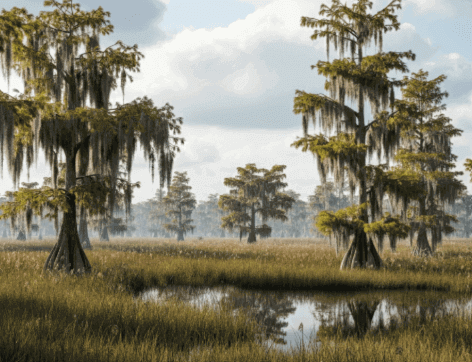Investing in swampland might seem like a niche market, but with over 220 million acres of wetlands spread across the United States, it’s a unique type of real estate with its own set of rules. These properties can offer incredible opportunities for conservation, recreation, or even long-term investment, but only if you know what you are doing. Making an informed decision is the most important step you can take before buying swampland. Steve Daria and Joleigh, esteemed real estate investors and cash land buyers, have mastered the art of navigating the intricate world of specialized properties nationwide. They emphasize that understanding federal and state regulations is crucial for any potential buyer. Before buying swampland, getting expert advice is key to protecting your assets and reducing potential risks. If you have questions about a wetland property or want to discuss your options about buying swampland, book a free discussion with our team today.
Key Points
- Check for Legal Access: When buying swampland, ensure the property has guaranteed legal access, which means there is a public road leading to it or a recorded easement. A landlocked parcel without legal access has very limited use and can be extremely difficult to sell in the future.
- Understand Zoning and Land Use Restrictions: Every property is subject to local and federal regulations, which are particularly strict for areas with wetlands. Check with the county planning department to confirm the zoning and learn about any restrictions on building, clearing, or other activities.
- Conduct a Perk Test: If you ever plan to build a home on the land, you will need a septic system, which requires a successful percolation (perk) test. This test determines whether the soil can absorb water properly, and failing it means you likely cannot build on it.
- Verify Property Boundaries: Before buying swampland, ensure your property boundaries are clearly defined by hiring a professional surveyor. Relying on old maps or visuals can lead to disputes with neighbors or accidentally encroaching on their land.
- Assess Environmental Factors: Be aware of the unique environmental aspects of swampland, such as flood risk and protected wildlife habitats. These factors can impact insurance costs, development possibilities, and your overall enjoyment of the property.
What exactly is considered swampland or wetlands in real estate?
In real estate, “swampland” or “wetlands” refers to land that is saturated with water, either permanently or seasonally, to the point where it takes on the characteristics of a distinct ecosystem.
This includes marshes, bogs, and swamps, where the soil is often saturated and may support aquatic plants.
Official definitions from the U.S. Army Corps of Engineers and the EPA primarily center on hydrology, soil type, and vegetation.

It’s important to understand this definition before buying swampland, as federal, state, and local regulations often protect these areas.
These laws can strictly limit or even prohibit development, including building, dredging, or filling the land.
Therefore, what may appear to be a cheap piece of land could have significant use restrictions.
A formal wetland delineation survey can confirm if a property contains regulated wetlands.
This is a crucial step in understanding a property’s true potential and limitations.
Get Started: Get Your Cash Offer Below…
We are direct land buyers. There are no commissions or fees and no obligation whatsoever. Start below by sharing where your property is and where we can send your offer…
Is it legal to buy and own swampland in the United States?
In the United States, it is perfectly legal to acquire and hold ownership of swampland, just as with any other form of real estate.
You can hold the title to a wetland property, and it will be officially recorded in your name.
However, the main legal issues arise not from ownership but from what you are allowed to do with the land after you buy it.
Federal and state laws, such as the Clean Water Act, heavily regulate activities in and around wetlands to protect these sensitive ecosystems.
This means you will likely face significant restrictions on building, dredging, filling, or altering the land in any way.
It is crucial to understand these limitations before buying swampland because they directly impact the property’s value and usability.
Owning the land is perfectly fine, but using it for development may be very difficult or even impossible.
Always conduct thorough due diligence on all regulations to know exactly what you are getting into with your purchase.
What are the potential benefits of owning a swampland?
- Affordable Investment: Swampland is often priced significantly lower than other types of rural land, making it an accessible entry point for first-time land investors. This affordability allows you to own a larger parcel of land for a fraction of the cost of a buildable lot.
- Conservation and Habitat Preservation: Owning wetlands offers the chance to protect a crucial natural ecosystem, a key consideration before buying swampland. Many owners use their land to preserve wildlife habitats, protect water quality, and contribute to environmental conservation efforts.
- Recreational Opportunities: These properties are great for outdoor activities like hunting, fishing, and kayaking. You can create your own private natural retreat for personal enjoyment and escape from the hustle and bustle of city life.
- Potential for Tax Benefits: It’s wise to investigate potential tax advantages before buying swampland, as some programs reward conservation-minded landowners. You may be eligible for tax deductions or credits by placing your property in a conservation easement, which protects it from future development.
- Privacy and Seclusion: Swampland parcels are often large, remote, and undeveloped, providing a level of privacy and seclusion that is hard to find with other property types. This makes them ideal for anyone seeking a peaceful and undisturbed connection with nature.
How do I check for building restrictions and environmental regulations on a wetland property?
To check for building restrictions and environmental regulations on a wetland property, you must contact several government agencies.
Start with the local county planning and zoning department to inquire about local land use ordinances and building codes.
Next, you should contact your state’s Department of Environmental Protection, as they enforce state-specific rules for developing on or near wetlands.
It is also essential to consult the U.S. Army Corps of Engineers, which has federal authority over activities in navigable waters and wetlands under the Clean Water Act.
These agencies can provide maps, rules, and permit requirements that apply to the specific parcel you are interested in.
Before buying swampland, you should hire an environmental consultant to perform a wetland delineation.
This study officially identifies and maps the protected wetland areas on the property.
Understanding these layers of regulation is vital. It will help you determine if your plans for the land are even possible.
How do I figure out the fair market value of a swampland parcel?
- Analyze Comparable Sales (Comps): Look at what similar wetland properties have recently sold for in the same area. This is the most common way to estimate value, but be sure to compare properties with similar access, size, and restrictions.
- Assess Usability and Access: A property’s value is tied to its potential uses, a key point to check before buying swampland. Consider whether the land has legal road access and whether it is suitable for recreational activities, such as hunting or fishing.
- Consult a Specialized Appraiser: Hire an appraiser who has specific experience valuing rural and wetland properties. Their professional opinion will provide the most accurate assessment, as they understand the unique market dynamics and regulatory challenges involved.
- Factor in Regulatory Limitations: The presence of development restrictions significantly impacts value; therefore, it is vital to research them before buying swampland. If regulations prevent building or other activities, the land will be worth less than a more usable parcel.
- Evaluate Timber and Mineral Rights: Check if the property includes valuable assets, such as timber or mineral rights, as these can add considerable value. The potential income from harvesting timber or leasing mineral rights can significantly increase a property’s value.

What legal documents are required to complete the purchase of swampland?
Completing the purchase of swampland involves several key legal documents, similar to any other real estate transaction.
The cornerstone of any sale is the purchase agreement, a document detailing the price, closing date, and other specific conditions.
You will also receive a new deed, which is the official paper that transfers ownership of the property to you.
A title search report and title insurance policy are essential for confirming that the seller has the legal right to sell the land and that it is free of liens or ownership claims.
It is a wise move to review all survey documents and environmental reports before buying swampland to fully understand the property’s boundaries and restrictions.
Upon closing, you will execute a settlement statement, typically referred to as a HUD-1 or Closing Disclosure, which meticulously outlines every financial detail of the transaction.
Finally, the signed deed will be officially recorded with the county, making your ownership a public record.
To ensure every document is handled correctly, it is best to work with an experienced real estate professional.
Contact a professional for expert guidance on your land purchase today.
**NOTICE: Please note that the content presented in this post is intended solely for informational and educational purposes. It should not be construed as legal or financial advice or relied upon as a replacement for consultation with a qualified attorney or CPA. For specific guidance on legal or financial matters, readers are encouraged to seek professional assistance from an attorney, CPA, or other appropriate professional regarding the subject matter.
